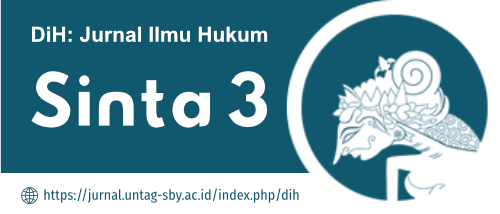ETIKA PROFESI ADVOKAT SEBAGAI UPAYA PENGAWASAN DALAM MENJALANKAN FUNGSI ADVOKAT SEBAGAI PENEGAK HUKUM
DOI:
https://doi.org/10.30996/dih.v12i24.2242Keywords:
, advocate, professional ethics, law enforcementAbstract
Indonesia as a state of law based on Pancasila and the Constitution of the Republic of Indonesia Year 1945 guarantees equality for all before the law (equality before the law). In realizing the principles of law in the society and state, the role and function of Advocate as a profession that is free, independent and responsible is important, in addition to the judiciary and law enforcement agencies such as the police and prosecution. The problems in this dissertation are: (1) What are the basic ratiologic advocate violation of professional ethics Advocate? and (2) How does the concept of behavioral guidelines advocate in practicing a profession as legal counsel in an effort to control the Advocate in law enforcement? The method used is normative research enables researchers to utilize the findings of empirical legal science and other sciences for the benefit and the analysis and explanation of law without changing the character of law as a normative science. The method used in this research is the approach of legislation or statute approach, arguing that research must necessarily normative approach legislation, because examined are various rules of law as well as its central theme a focus of research. The results of basic research advocate consideration as a respectable profession and became an important part of chess dynasty law enforcement, Advocate has responsibility in undertaking to participate in the realization of the rule of law. The responsibility is not merely a necessity but a legally mandated obligations arising from the demands of conscience. The obligations of an advocate is reflected in the ability of responsible advocate against God, professional code of ethics, rules of law and society. Ultimately lawyer also required to be able to account for his actions to the public as an implementation of a sense of responsibility to God, codes and regulations. The concept of behavioral guidelines advocate in practicing a profession as a lawyer as Advocate control efforts in law enforcement by law or code of ethics which is already adequate, but rather on how to implement them. Relating to the existence of a single container and how to manage the Honorary Council (DK) Organization. Monitoring system needs to be upgraded with the supervision of the Advocate smoothed by the Advocate Organization with the Honorary Council to enforce the Law on Advocates and the Code of Conduct.Downloads
References
Abdulkadir Muhammad, 2004, Hukum dan Penelitian Hukum, Citra Aditya Bakti, Bandung.
Frans Hendra Winata, 1995. Advokat Indonesia, Citra, Idealisme dan Kepribadian, Sinar Harapan, Jakarta.
Jazim Hamidi, 2005, Makna dan Kedudukan Hukum Naskah Proklamasi 17 Agustus l945 dalam Sistem Ketatanegaraan Republik Indonesia, Disertasi, Program Pascasarjana Universitas Padjadjaran, Bandung
John Rawls, 1971, A. Theory of Justice, Belknap, Harvard.
Lasdin Wlas, Wlas, Lasdin, 1989, Cakrawala Advokat Indonesia, Liberty Yogyakarta.
Munir Fuady, 2005, Profesi Mulia (Etika Profesi Hukum bagi Hakim, Jaksa, advokat, Notaris, Kurator, dan Pengurus), PT. Citra Aditya Bakti, Bandung.
Mukti Arto, 2001, Mencari Keadilan (Kritik Solusi terhadap Praktik Peradilan Perdata di Indonesia), Pustaka Pelajar, Yogyakarta.
Peter Mahmud Marzuki, 2006. Penelitian Hukum, Kencana Prenada Media Group, Jakarta.
Rapaun Rambe, 2003, Teknik Praktek Advokat, PT. Grasindo, Jakarta.
Satjipto Rahardjo, 1991, Ilmu Hukum, Citra Aditya Bakti, Bandung.
Shidarta, 1990, Mengenai Batasan Profesi, lihat: Black, Henry Campbell. Black’s Law Dictionary. Ed. 6. St. Paul: West Publishing.
Downloads
Published
Issue
Section
License
Authors who publish with DiH: Jurnal Ilmu Hukum agree to the following terms:
- Authors transfer the copyright and grant the journal right of first publication with the work simultaneously licensed under a CC BY-SA 4.0 that allows others to share the work with an acknowledgement of the work's authorship and initial publication in this journal.
- Authors are able to enter into separate, additional contractual arrangements for the non-exclusive distribution of the journal's published version of the work (e.g., post it to an institutional repository or publish it in a book), with an acknowledgement of its initial publication in this journal.
- Authors are permitted and encouraged to post their work online (e.g., in institutional repositories or on their website) prior to and during the submission process, as it can lead to productive exchanges, as well as earlier and greater citation of published work (See The Effect of Open Access)










